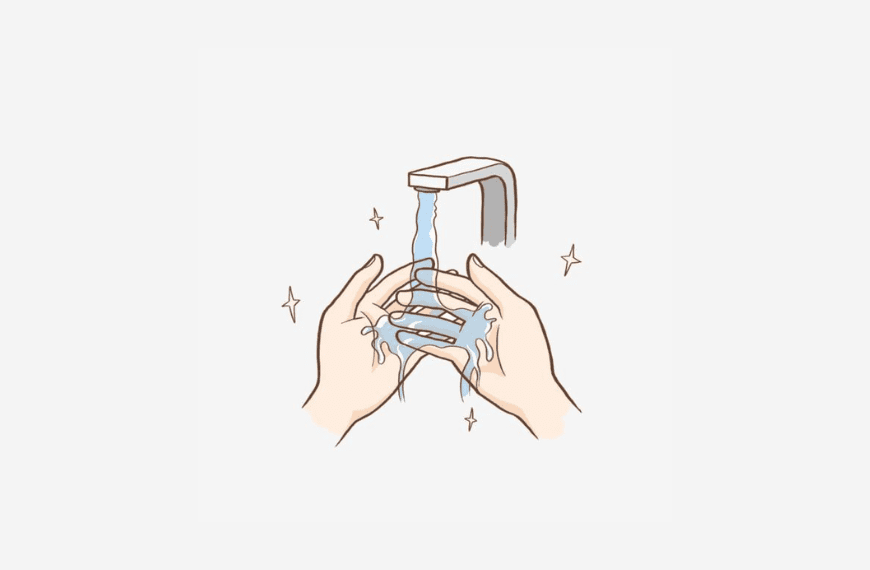

Before Entering the Lavatory
بِسْمِ اللّٰهِ ، اَللّٰهُمَّ إِنِّيْ أَعُوْذُ بِكَ مِنَ الْخُبُثِ وَالْخَبَائِثِ
Bismi-llāh, allāhumma innī aʿūdhu bika mina-l-khubuthi wa-l-khabā’ith
“In the Name of Allah. O Allah, I seek Your protection from the male and female devils.“
Alī b. Abī Tālib (raḍiy Allāhu ‘anhu) narrated that the Messenger of Allah ﷺ said: “The screen between the jinn and the nakedness of the children of Ādam when they enter the lavatory is to say: ‘In the Name of Allah.’” (Tirmidhī 606)
Anas b. Mālik (raḍiy Allāhu ‘anhu) narrated that whenever the Prophet ﷺ went to answer the call of nature, he used to say: “O Allah, I seek Your protection from the male and female devils.” (Bukhārī 142, Muslim 375)
After Coming Out of the Lavatory
غُفْرَانَكَ
Ghufrānak
“I seek Your forgiveness.“
ʿĀishah (raḍiy Allāhu ‘anhā) narrates that when the Prophet ﷺ came out of the lavatory, he used to say: [the above]” (Abū Dāwūd 30)
Before Wudu
بِسْمِ اللّٰهِ
Bismi-llāh.
“In the Name of Allah.“
The Messenger of Allah ﷺ said: “There is no Ṣalāh for a person who does not perform wudhū, and there is no wudhū for a person who does not mention the name of Allah (in the beginning).” (Abū Dāwūd 101, Ibn Mājah 399)
When Passing Fingers Through the Beard
هَـٰكَذَا أَمَرَنِيْ رَبِّيْ عَزَّ وَجَلَّ
Hākadhā amaranī Rabbī ‘azza wa jal
“This is what I have been ordered to do by my Lord.“
Anas b. Mālik (raḍiy Allāhu ‘anhu) narrated: “Whenever the Messenger of Allah ﷺ performed ablution, he took a handful of water, and, putting it under his chin, made it go through his beard, saying: [the above].” (Abū Dāwūd 145, Bayhaqī 250)
After Completing Wuḍu #1
أَشْهَدُ أَنْ لَّا إِلٰهَ إِلَّا اللّٰهُ وَحْدَهُ لَا شَرِيْكَ لَهُ ، وَأَشْهَدُ أَنَّ مُحَمَّدًا عَبْدُهُ ورَسُوْلُهُ ، اَللّٰهُمَّ اجْعَلْنِيْ مِنَ التَّوَّابِيْنَ ، وَاجْعَلْنِيْ مِنَ المُتَطَهِّرِيْنَ
Ash-hadu al-lā ilāha illā-llāhu waḥdahū lā sharīka lah, wa ash-hadu anna Muḥammadan ʿabduhu wa rasūluh. Allāhumma-j-ʿalnī mina-t-tawwābīn, wa-j-ʿalnī mina-l-mutaṭahhirīn.
“I bear witness that there is no god but Allah. He is Alone and He has no partner whatsoever. And I bear witness that Muhammad ﷺ is His slave and His Messenger. O Allah, make me amongst the repentant, and make me amongst those who purify themselves“
The Messenger of Allah ﷺ said: “Whoever perfects his wudhū and then says [the above], the eight gates of Paradise will be opened for him. He may enter through whichever one he wishes.” (Tirmidhī 55)
After Completing Wuḍu #2
سُبْحَانَكَ اللّٰهُمَّ وَبِحَمْدِكَ ، أَشْهَدُ أَنْ لَّا إِلٰهَ إِلَّا أَنْتَ ، أَسْتَغْفِرُكَ وأَتُوْبُ إِلَيْكَ
Subḥanaka-llāhumma wa bi ḥamdik, ash-hadu al-lā ilāha illā Ant, astaghfiruka wa atūbu ilayk.
“You are free from imperfection, O Allah, and all praise is to You. I bear witness that there is no god but You. I seek Your forgiveness and turn to You in repentance.“
The Messenger of Allah ﷺ said: “Whosoever does wudhū and says [the above], it will be recorded in a parchment and then sealed with a seal which will not be broken till the Day of Judgement.” (Nasā’ī in ʿAmal al-Yawm wa-l-Laylah 81, al-Ṭabarānī in al-Duʿā’ 389)